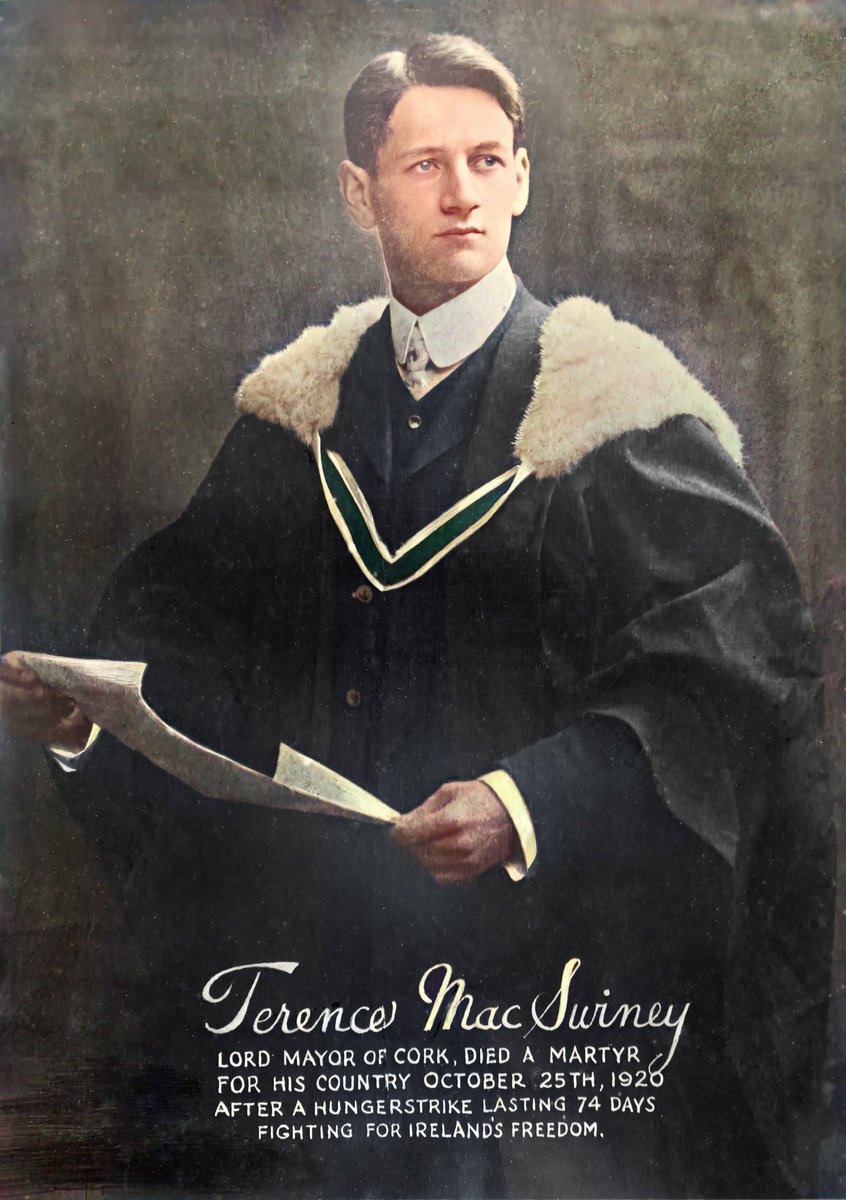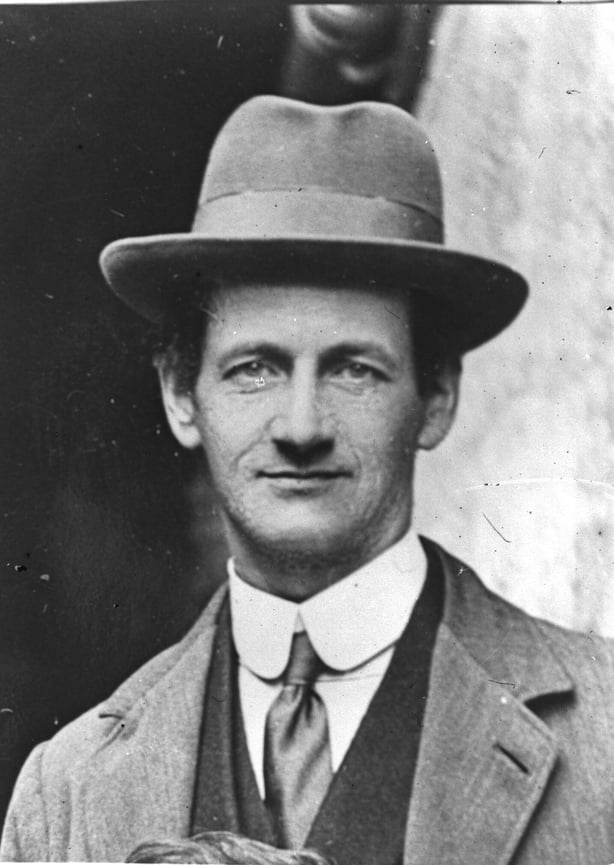Remembering Terence MacSwiney: A Legacy Of Sacrifice And Courage - Latest News
Can the words and actions of a man who died a century ago still resonate with those in power today? For the current leaders of the independent Irish state, the life and sacrifice of Terence MacSwiney, the former Lord Mayor of Cork, presents a powerful and necessary lesson in leadership, sacrifice, and the enduring pursuit of freedom.
Terence MacSwiney's story is one etched in the annals of Irish history, a tale of unwavering dedication to the cause of Irish independence. His death on October 25, 1920, after a grueling 74-day hunger strike in Brixton Prison, London, ignited a firestorm of both national and international outrage. MacSwiney's actions, a direct protest against British policies in Ireland, catapulted him into the global spotlight, making him a symbol of resistance against oppression.
MacSwiney, a man of letters, a playwright, and a politician, was much more than just a mayor; he was a cultural force. Born in Cork in 1879 to Irish nationalist parents, his life was intertwined with the struggle for Irish identity. He was a founding member of the Cork Celtic Literary Society in 1901 and, alongside Daniel Corkery, established the Cork Dramatic Society in 1908, writing several plays himself. His work celebrated the Irish language and Irish heritage, themes central to the fight for independence. His commitment to the Irish cause was absolute, a commitment that would ultimately lead him to the ultimate sacrifice.
- Snow White Bluray Release Date Where To Buy Disney
- Dan Gillian At Boeing Leadership Career Highlights
| Attribute | Details |
|---|---|
| Full Name | Terence James MacSwiney |
| Born | March 28, 1879, Cork, Ireland |
| Died | October 25, 1920, Brixton Prison, London, England (due to hunger strike) |
| Nationality | Irish |
| Occupation | Playwright, Author, Politician |
| Political Affiliation | Sinn Fin |
| Notable Positions | Lord Mayor of Cork (1920) |
| Key Accomplishments | Prominent figure in the Irish War of Independence, Author of plays and political writings, Advocate for Irish culture and language. |
| Education | North Monastery Christian Brothers' School, Royal University of Ireland |
| Legacy | Symbol of Irish resistance, inspiration for independence movements globally, literary contributions. |
| Reference Website | Britannica: Terence MacSwiney |
In March 1920, the brutal murder of Toms MacCurtain, the then Lord Mayor of Cork, by the Royal Irish Constabulary, deeply affected MacSwiney. MacCurtain, a close friend and comrade, was killed on the direct orders of the British government, an act that solidified MacSwiney's resolve. In the wake of this tragedy, he was elected as the Sinn Fin Lord Mayor of Cork during the Irish War of Independence. His leadership was immediately tested when he was arrested on charges of sedition and imprisoned in Brixton Prison, a move designed to silence him and quell the rising tide of Irish nationalism.
His response to imprisonment was as defiant as it was symbolic. MacSwiney commenced a hunger strike, a desperate act of protest against British rule and a demand for his recognition as a political prisoner. His actions and his resolve captured the worlds attention. International newspapers followed his decline, and sympathizers from across the globe sent messages of solidarity. The world watched as MacSwiney, weakened but unyielding, slowly faded. His hunger strike became a potent symbol of resistance, a testament to his belief in the cause of Irish freedom.
amon de Valera, the future President of Ireland, delivered a powerful memorial address, eulogizing MacSwiney. De Valera praised his bravery, his sacrifice, and his unwavering commitment to Ireland. This event showcased the profound respect and the deep gratitude felt by the Irish people for MacSwiney's sacrifice.
- Discover Connor Dent Breathwork Bodywork More Insights
- Death Band Merch Story Punk Before Punk Existed
MacSwiney's decision to go on hunger strike was a turning point in the Irish War of Independence. His decision sparked outrage across the world. In Catalonia, Spain, news of his death led to public displays of mourning and solidarity. The impact was also felt in India. MacSwiney's act of defiance inspired many, including Mahatma Gandhi, who saw in MacSwiney's sacrifice a powerful example of non-violent resistance. It served as a beacon of hope and a testament to the power of the human spirit to withstand tyranny.
The impact of MacSwiney's sacrifice reverberated throughout the independence movements of the time. It was a powerful demonstration of the lengths to which people would go in pursuit of self-determination. In the face of immense suffering, MacSwiney's unwavering commitment to his ideals offered a glimmer of hope to all those struggling against oppression.
His funeral in Cork was a monumental event, attended by over 100,000 people. It was a moment of profound mourning, but also a demonstration of defiance. The sheer number of people who turned out to pay their respects, despite the presence of British forces, was a testament to MacSwiney's significance and the powerful emotional resonance of his sacrifice. The event was a symbolic assertion of Irish identity and a clear message to the British authorities that the spirit of independence would not be broken.
The stories surrounding MacSwiney's death highlight the legal complexities of the time. The Interments (Felo de Se) Act of 1882, which removed the matter of ignominious burial in England, is relevant. This legal context, though perhaps not the primary focus of the outpouring of grief, provided the backdrop against which his final act of protest was played out.
His legacy extends beyond the political arena. MacSwiney's literary contributions, as a playwright, poet, and artist, are equally significant. He used his writing to explore themes of Irish identity, history, and the struggle for independence. His plays and poems became a source of inspiration and a powerful means of promoting Irish culture and ideals. His legacy includes his contributions as a writer, his legacy continues to inspire. For example, the Terence MacSwiney Community College, situated in Hollyhill, was opened in March 1980 and dedicated to the memory of the Cork-born playwright, author, and politician.
MacSwineys struggle and his death in Brixton Prison brought worldwide attention to the Irish struggle for freedom. The impact of his passing was such that it spurred on others to take up the cause. The echoes of his actions are still heard today, in discussions of Irish identity, self-determination, and the enduring fight for freedom.
The fact that the Catalan people went into full mourning when they heard the news of MacSwineys death highlights the impact of his message. Women in Catalonia were inspired by his actions, adding another layer to the international significance of his struggle. His actions, and the response of the Catalan people, reveal the interconnectedness of global struggles for liberation.
MacSwiney's grandson, Cathal MacSwiney Brugha, has provided invaluable insights into the personal side of the man, preserving the memory of his grandfather for future generations. His reflections provide an intimate look at the human side of this historical figure, connecting him in a more personal way to the present day.
Even in death, MacSwiney remained a powerful symbol. The fact that his death inspired many nationalists and brought worldwide attention to Ireland's freedom struggle proves that his influence was not limited to his lifetime. His legacy continues to inspire. His legacy has transcended generations, and his actions continue to resonate, inspiring those fighting for justice and independence worldwide.
The financial struggles faced by his widow, Muriel, are a poignant reminder of the human cost of such sacrifices. Despite spending his entire inheritance by 1950, she secured a widow's pension. The creation of a chapel in his honor, however, brought some division.
MacSwiney's decision to go on hunger strike was a conscious one. He was a man of firm principles, who was willing to die for his convictions. His sacrifice was not in vain. It was a pivotal moment in the Irish War of Independence, helping to turn the tide against British rule. His arrest in August 1920, his subsequent hunger strike, and his death in October of the same year, remain a defining chapter in Irish history. His legacy transcends time and place, and his words still inspire.
The opening of a museum dedicated to the memory of MacSwiney in Cork, demonstrates the enduring respect and recognition of his contribution to the Irish struggle for independence. The museum served as a place for his memory to live on, for people to understand his actions, and for the inspiration of his actions to remain.
Dave Hannigan's notes in his book, "Terence MacSwiney: The Hunger Strike That Rocked an Empire," show the long-term effects of his actions. The case, as highlighted, is a reminder of the human sacrifice which paved the way for the future. The sacrifices of the Irish volunteers, like Richard Coleman and Pierce McCann, provide further context, highlighting the devastating impact of the fight for Irish freedom.
The centenary of Terence MacSwiney's death is a fitting time to reflect on his life and legacy. The current leaders of Ireland would do well to heed his words, and to remember the values for which he stood. His struggle is a powerful reminder of the sacrifices made to achieve independence, and the enduring importance of fighting for freedom, justice, and self-determination.
- Bmp Chemistry Explained Your Guide To Understanding Blood Tests Reactions
- Hoover Strong Refining Wholesale Jewelry Solutions Learn More

Terence MacSwiney, Hunger Striking, and the Intertwined Histories of

Terence MacSwiney, Sinn Féin Mayor of Cork died after 74 days on Hunger

Dead their conquerers the significance of the 1920 hunger strikes